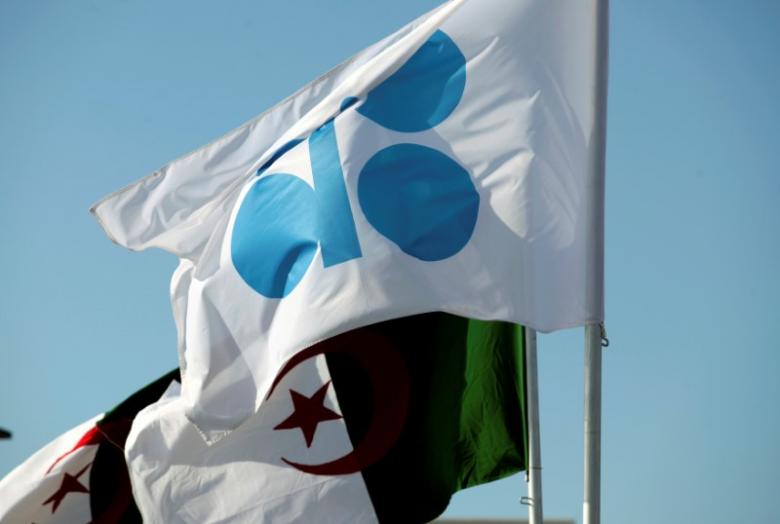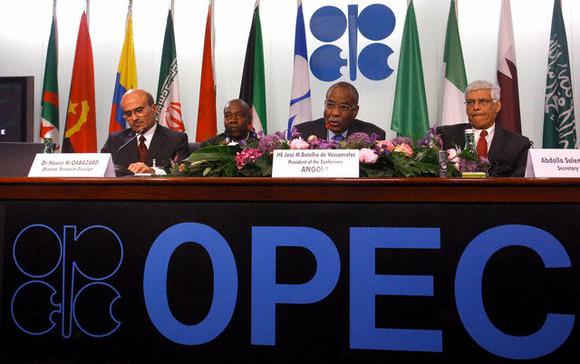In short, today OPEC cohesion is illusory and more than ever a mere façade. For the foreseeable future, OPEC provides merely a gathering point, with little relevance for the direction of the oil market and oil prices.
The OPEC and Algeria flags are pictured ahead of an informal meeting between members of the Organization of the Petroleum Exporting Countries (OPEC) in Algiers, Algeria September 28, 2016. REUTERS/Ramzi Boudina
ANALYSIS:
On September 28, OPEC oil ministers held an informal meeting in Algiers to consider a reduction in their aggregate oil output with the goal of boosting oil prices.
They announced an agreement to reduce output to a range of 32.5 to 33 million barrels per day (that is a reduction of about 250 to 750 thousand barrels per day, or less than one percent of world output) at their subsequent regular meeting.
However, they left the details (how the reduction would be distributed among its 14 members) to a committee with the specifics to be adopted at their next scheduled meeting on November 30.
Some observers heralded the announcement of the ‘intended’ production cut, to be determined later, as a historic decision and the first announced cut since 2008. It sparked a rally in oil prices of 5-6 percent with some predictions that prices could jump by as much 20 percent by the time it was confirmed and implemented later in November.
This episode could lead one to conclude that OPEC is where the action is when it comes to oil prices. As further confirmation of OPEC’s importance could be seen at OPEC meetings where oil reporters stalk the Saudi oil minister (OPEC’s largest producer by far) and follow OPEC meetings and their resulting pronouncements to shed light on the future of oil prices.
Is all this misinformation or is it a good predictor of oil prices? Is there much value in basing oil price predictions on who happens to be the Saudi oil minister and what OPEC tells the world at their meetings? We think not. Let us explain.
The price of oil, as in the case of other internationally traded commodities, is determined by its supply and demand. But there are special considerations in the case of oil that deserve mention. Government regulations and taxes are more pervasive for oil in most countries and affect both the demand and supply of oil.
Exchange rates of the dollar to a country’s currency matters more for the trade in oil as oil is priced in dollars. A significant percentage of the global oil output, and an even larger percent of oil exports, comes from a group of countries that belong to a cartel, namely OPEC, with the goal of setting production quotas for members to support prices that are in the group’s interests.
Because OPEC members are sovereign countries and not private firms, the profit motive is not their only objective. Survival of ruling regimes (monarchies, clerics, military, dictatorships), geopolitical realities, and domestic political and economic considerations in fact override profit and revenue objectives.
So should we listen to what comes out of OPEC meetings? Has OPEC been an effective cartel since its formation in 1960?
In the past, OPEC has almost never acted as an effective cartel, namely members restricting their output to support a price goal. The members cooperated in the period 1970-1973 as they tried to wrestle control away from the major oil companies that had colluded for years at the expense of oil exporting countries.
But towards the end of 1973, OAPEC (Arab countries within OPEC) in an attempt to undermine support for Israel tried to embargo exports to the US and The Netherlands but did not cut output, so Iranian oil initially went these countries while Arab oil was routed to other markets! Iran even expanded its output. After recognizing this loophole, OAPEC decided to reduce output in steps to pressure the US, but Saudi Arabia continued to ‘secretly’ sell fuel to the US Sixth Fleet for the Vietnam War effort while Arab and revolutionary Iraq did not even cut its output! What does this tell us? Even when a political issue of utmost importance was at stake for Arab members of OPEC, they did not do what they had agreed to.
So why should we expect more of OPEC as a whole? Since 1974, all OPEC members have not simultaneously adhered to any announced production cutbacks. Before we take OPEC announcements seriously, we should ask if they do what they say? The answer is clearly no.
Yes, OPEC members hold regular and emergency meetings to discuss the oil market and set price targets and individual quotas, but it has been largely a façade to flex their economic muscle to garner international attention. There have been short periods of coordination and cooperation but little or no ability to cut back output and maintain individual production quotas. The facts are clear.
For much of the time since 1979, most members did not have significant excess capacity, some were under UN or US unilateral sanctions, and Saudi Arabia was adjusting its output up or down in order to realize its own goals. During those days, Saudi Arabia was effective in stabilizing oil markets when markets were tight and Saudi Arabia was the OPEC member with significant excess capacity.
Saudi Arabia, with no sacrifice on its part, would increase output and exports to moderate price increases. In doing so, it benefited with higher revenues while receiving thanks the world over for doing what was in its own interest! But one country unilaterally acting as a “swing producer” cannot be called a cartel and there was little need for an OPEC for Saudi Arabia to pursue its interests.
Today things are different as markets are awash with oil (from production increases in OPEC and rapid increase in shale oil output and slow growth in demand from global economic slowdown) and a cut in oil output is called for prices to increase. But what we see is that Saudi Arabia is less willing to cut, as opposed to increase, output unless others do also.
It would appear that today would be a good time to cooperate as prices have collapsed and also because the future does not look bright. But OPEC has been hopeless in this effort over the last two or so years because it has internal political problems among its members as never before. It would appear that the six members of the Gulf Cooperation Council (GCC), especially Saudi Arabia, see Iran and Iraq as existential threats. Relations between Iran and Iraq on the one hand and the GCC on the other are as bad as they have ever been in recent memory.
For the absolute rulers of the GCC, given their suspicion of Iranian intentions, economic failure and backwardness in Iran and Iraq may be more important goal than OPEC cohesion. It is understandable that Saudi Arabia will not adopt policies that will increase Iran’s oil revenues, strengthen its economy and give it the economic muscle to dominate the region.
In short, today OPEC cohesion is illusory and more than ever a mere façade. For the foreseeable future, OPEC provides merely a gathering point, with little relevance for the direction of the oil market and oil prices.
There is little point in listening to the Saudi or for that matter any OPEC minister if OPEC does not do what it proclaims.
The Saudi minister is simply a tape recorder and a mouthpiece. He listens, reports back and does as he is instructed by Riyadh. And if he should talk too much he would receive the same unceremonious sacking as the most famous oil minister of all time—Ahmad Zaki Yamani, who after talking too much learned of his ‘resignation’ on television upon returning to his home.
In Saudi Arabia, oil policy is more in the political than in the economic realm. This decision is reserved for the king, and for now it would appear relegated to the young deputy crown prince.
Given the ongoing and open hostilities in the region (Syria, Yemen, Bahrain) that is pitting OPEC members against one another and the unprecedented level of mistrust, it is highly unlikely that OPEC can reach an agreement that would reduce overall output while allowing Iran to increase its oil production to earlier levels. Source: Huffington Post.





